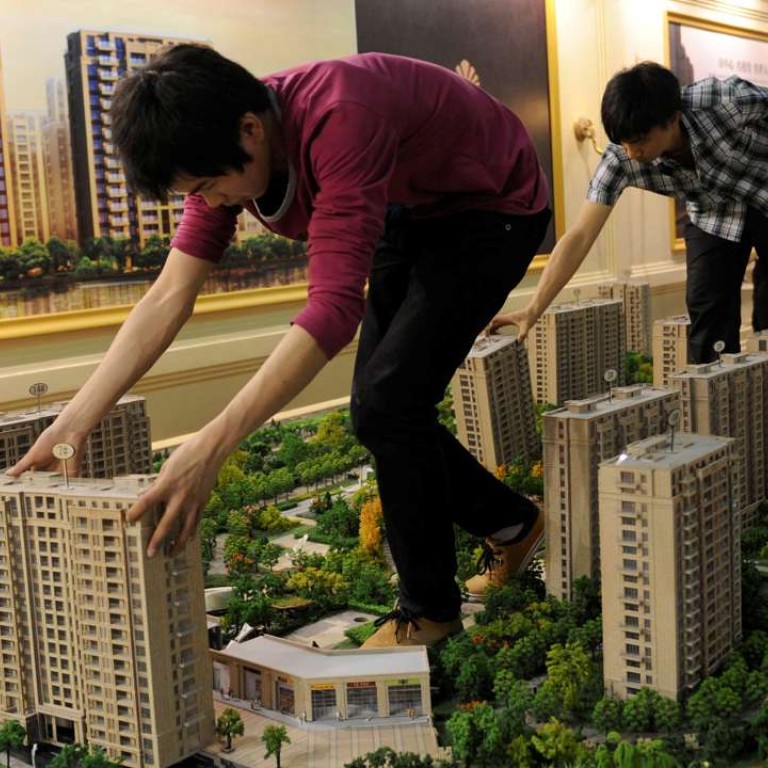
New | China’s soaring home prices ease in October as policy curbs kick in
September’s volume and price growth could be the peak after local governments take unusually harsh measures to cool the market
Home prices in China’s key cities have been on a roller coaster ride over the past four weeks after September’s rally – the strongest in more than six years – had unravelled by mid October amid tougher government curbs on home purchases.
Fifteen of China’s largest cities that imposed fresh property market tightening policies saw a cooling in house price growth in the first half of October, according to government figures published on Friday.
The biggest slowdown in prices was in Wuxi, Jiangsu province, which saw growth fall to 4.4 per cent by mid-October from 8.2 per cent at the end of September, the National Bureau of Statistics (NBS) said.
Next was Beijing, which saw its new home price growth sharply slow from 4.9 per cent in September to 1.2 per cent by mid-October. Shanghai’s month-on-month price gain eased to 0.7 per cent from 3.2 per cent, while in Shenzhen price growth cooled by 2.2 percentage points.
This is the first time the NBS has released a half-month price index for 15 cities, seen as an attempt to showcase the immediate results of the latest property purchasing curbs. However, it is not clear whether the half-monthly data release will become routine in the future.
Local governments across China rolled out a raft of tougher measures during the recent week-long National Day holiday in an effort to curb runaway home prices.
Authorities in at least 21 cities introduced measures ranging from raising down-payments for first and second homes to limiting purchases of multiple dwellings.
“The data shows the rapid price gains in the 15 first-tier and hot-spot second-tier cities have been curbed effectively. Prices are stabilising,” said Liu Jianwei, an economist with the NBS.
Indeed, new home prices in Shenzhen and Chengdu have actually fallen compared to a month ago, while price growth in the other 13 cities decelerated by between 1 and 3.8 percentage points.
Home sale transactions also cooled significantly, with NBS data showing sales in four cities slumped 60 to 80 per cent compared with a month ago.

Month-on-month new home prices, compiled by Bloomberg from NBS data from 70 cities, climbed 1.77 per cent in September, the biggest monthly gain since Bloomberg started the index in January 2009.
Home prices in Shanghai rose 3.2 per cent in September while in Beijing prices surged 4.9 per cent. The fastest monthly expansion was in Zhengzhou, where prices gained 7.6 per cent.
National housing sales by volume rose 26.9 per cent in the first three quarters, while in terms of value they surged 41.3 per cent, according to earlier NBS data.
Prior to the latest curbs, economists repeatedly warned that the housing rally was credit driven and would be prone to a sharp correction if credit suddenly tightened. New mortgage loans to households surged by 98.4 per cent to 3.63 trillion yuan in the first nine months of the year, equal to 35.7 per cent of total new lending, according to the People’s Bank of China.
Most analysts still believe the new round of tightening is aimed at reining in home buying panic to prevent a bubble, rather than being an all-round war that could threaten overall economic growth.
In addition government authorities – from the China Banking Regulatory Commission and China Securities Regulatory Commission to the Housing Ministry – are rolling out their own tightening measures in October to rein in runaway prices. Real estate firms now are suspended from selling exchange-regulated bonds, and their marketing activities are grinding to a halt after the Housing Ministry cracked down on what it called “false and misleading marketing”.

